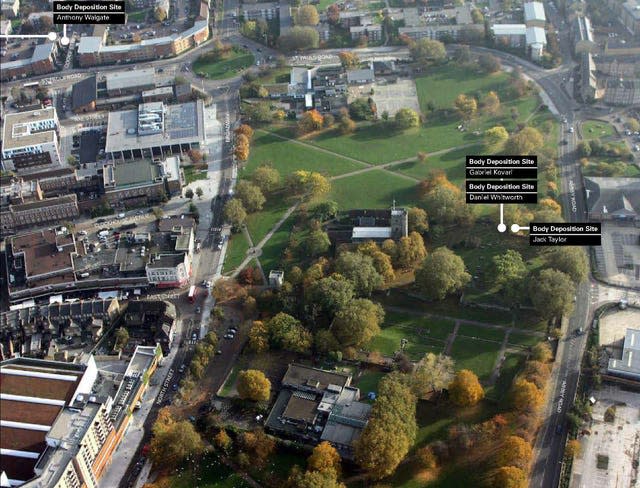‘Institutional homophobia’ meant police dismissed Port evidence, inquests told
A man who effectively turned detective to help investigate the murder of young, gay men by serial killer Stephen Port accused police of “institutional homophobia” after officers repeatedly dismissed evidence.
John Pape, who said he had a “whirlwind friendship” with Slovakian Gabriel Kovari in summer 2014, said he provided the Metropolitan Police with information he thought might link the deaths.
By September that year, Port had murdered Anthony Walgate, Mr Kovari and Daniel Whitworth by plying them with fatal doses of the drug GHB and dumping their bodies near his home in Barking, east London.
Mr Pape said he tracked down Mr Kovari’s former boyfriend, Thierry Amodio, who was told by another man – later established to be Port, seeking to distance himself from the investigation – that the men were drugged at orgies involving older men.

But Mr Pape said police seemed to ignore his attempts to provide them with information.
It came as the detective appointed to speak with Mr Kovari’s family admitted having never done so, saying she was “busy”.
Mr Pape told the inquests into the deaths at Barking Town Hall on Friday: “I think it’s been said here that the police were underfunded and under emotional strain.
“But I think, when grieving families, boyfriend and friends are getting close to the truth and trying to raise the alarm 10 months before the Met are even willing to acknowledge the deaths are suspicious, it can’t be a funding issue.
“What resources did the families and friends have?
“What emotional strain were we under at that time?
“The only thing that makes sense about how disturbingly incompetent this investigation was is prejudice.
“If the lives and deaths of young gay and bi men aren’t treated with significance and respect, I think that amounts to institutional homophobia.”
He said he was told by police at the original inquests for Mr Kovari and Mr Whitworth that there was no evidence which suggested the two men knew each other, despite a “suicide note” found on Mr Whitworth’s body taking responsibility for killing Mr Kovari.
It was later established that the note was written by Port and planted on Mr Whitworth’s body to mislead the police.
Mr Pape said he contacted gay charities, the gay press and campaigner Peter Tatchell to explain his concerns, adding: “I didn’t trust the police to link it properly.
“I was concerned about young, gay men in Barking.”
Mr Pape wept as he described hearing that Port had been arrested.
He said: “I think I felt a mix of emotions, certainly a kind of anger because it felt like I had these concerns… that an older man might be preying on younger men… and I felt like I hadn’t been listened to.
“I wish I could go back and tell myself to push it more.”

Peter Skelton QC, counsel for the Metropolitan Police, said officers involved in the case had apologised for the police response, but suggested to Mr Pape that “incompetence does not always equate to prejudice”.
Mr Pape replied: “I would agree that what happened here was incompetence… But behind that incompetence there has to be a reason why so many people were making such shocking mistakes.”
Detective Constable Jackie Baxter, who was appointed as family liaison officer (FLO) to the Kovaris, admitted she failed to contact them.
She told the inquest jury: “I can only put that down to the workload I was working on.
“That’s no excuse, I know.”
Andrew O’Connor QC, counsel to the inquests, said: “You were appointed as the FLO for the Kovari family … the clue is in the name.”
Ms Baxter replied: “The problem we had was we had an awful lot of work.
“I’d not done my job properly by not contacting the Kovari family.”
The inquest also heard that she erroneously referred to Mr Kovari as being from Lithuania, rather than Slovakia, in an email for the coroner.
She denied Mr O’Connor’s suggestion that she decided she was “not going to bother” to do her job as the FLO due to Mr Kovari being gay, a foreign national, or because his death was linked to drugs.
She said: “I was busy and I know I didn’t do what I was asked to do.”
Henrietta Hill QC, counsel for the victims’ families, said they were upset during her evidence after she referred to Mr Kovari’s death as “a horrible accident”, and for getting Mr Whitworth’s name wrong on more than one occasion.
Ms Baxter said: “I have not come here today to upset the family more than they already are.”
She denied suggestions that her failure to follow up on information from the public, including Mr Pape, was a manifestation of institutional prejudice.
Port, now 46, was given a whole life sentence in 2016 after being found guilty of murdering Mr Walgate, 23, Mr Kovari, 22, Mr Whitworth, 21, and final victim Jack Taylor, 25, between June 2014 and September 2015.
The inquests continue.

 Yahoo News
Yahoo News 
